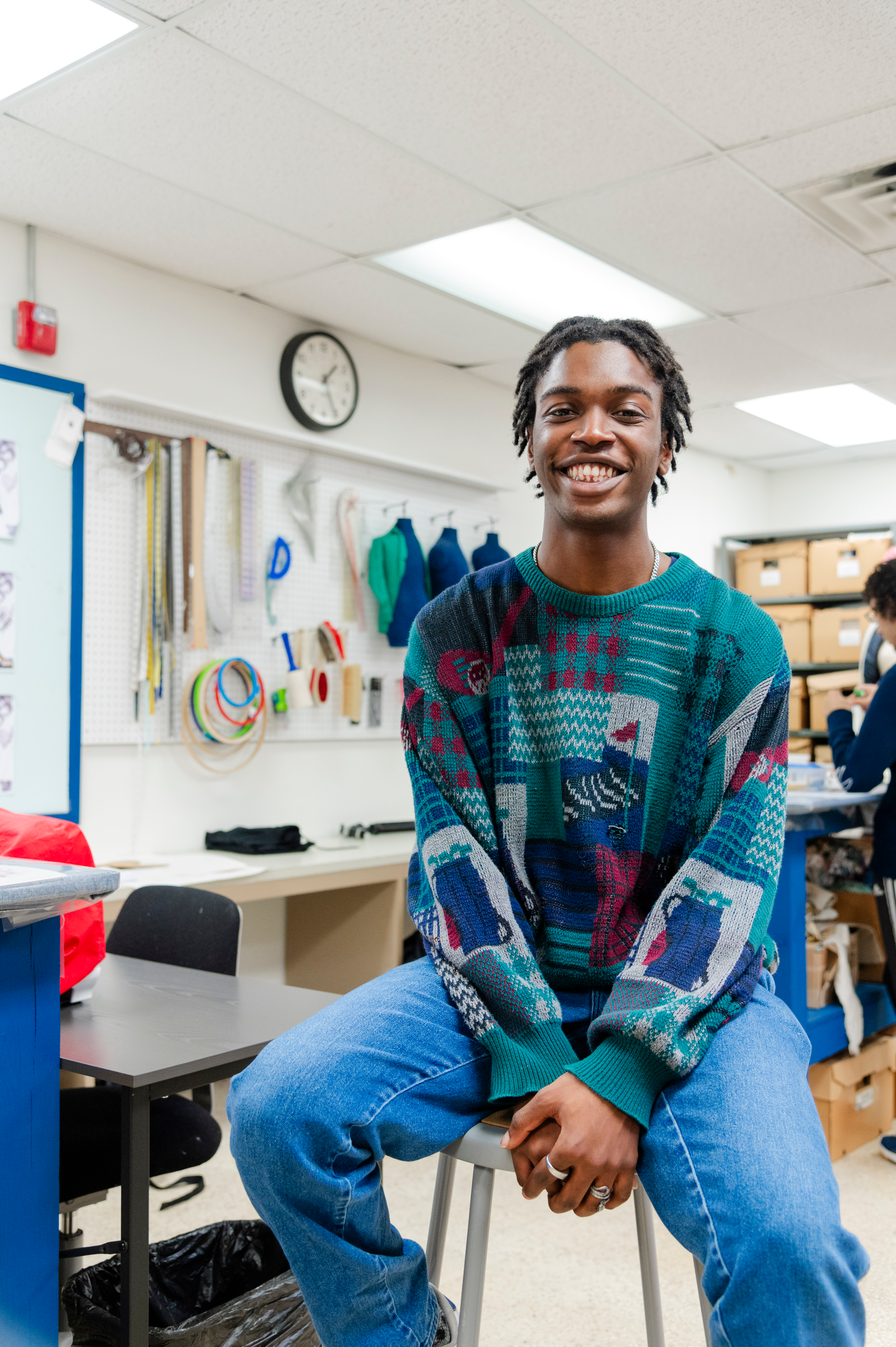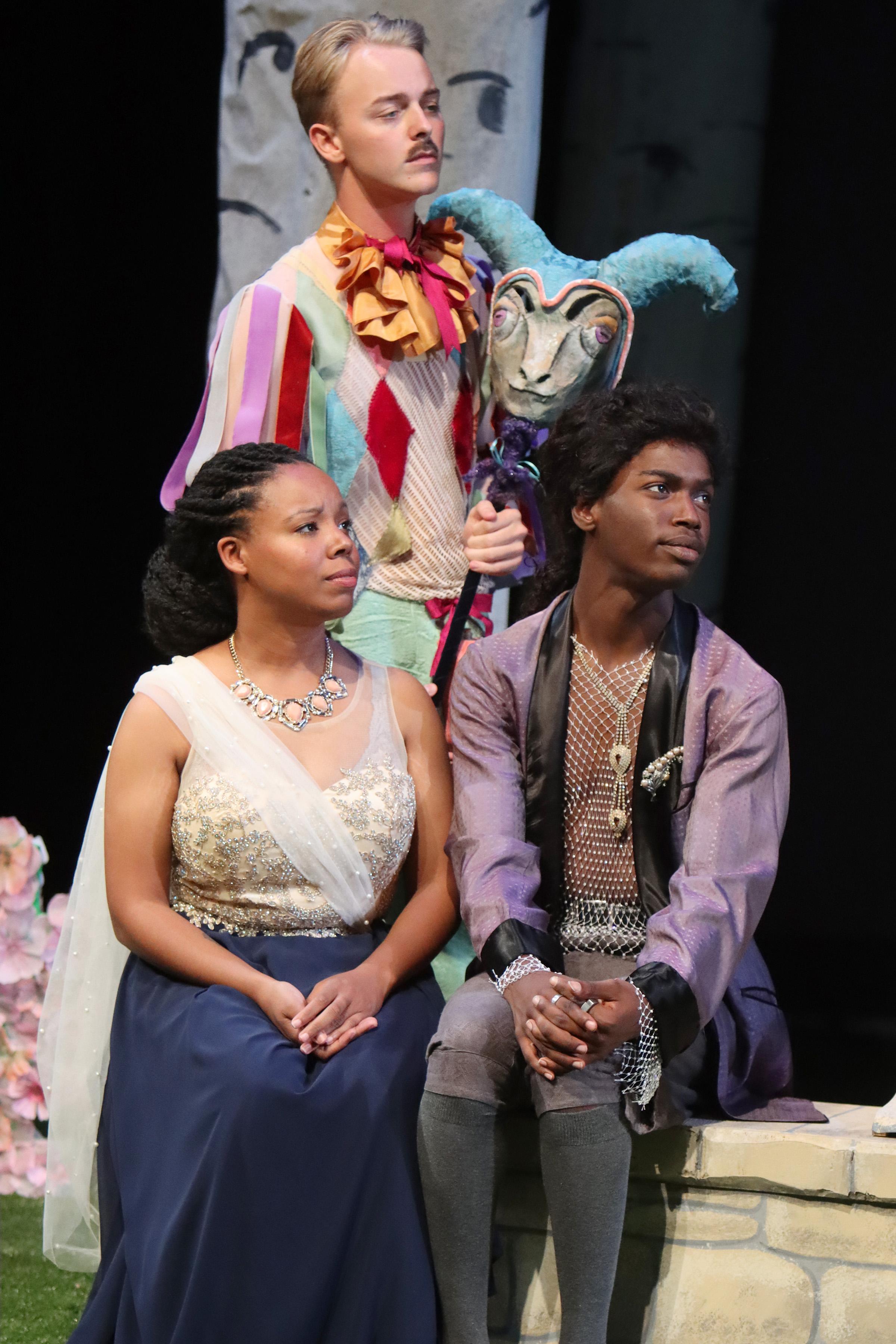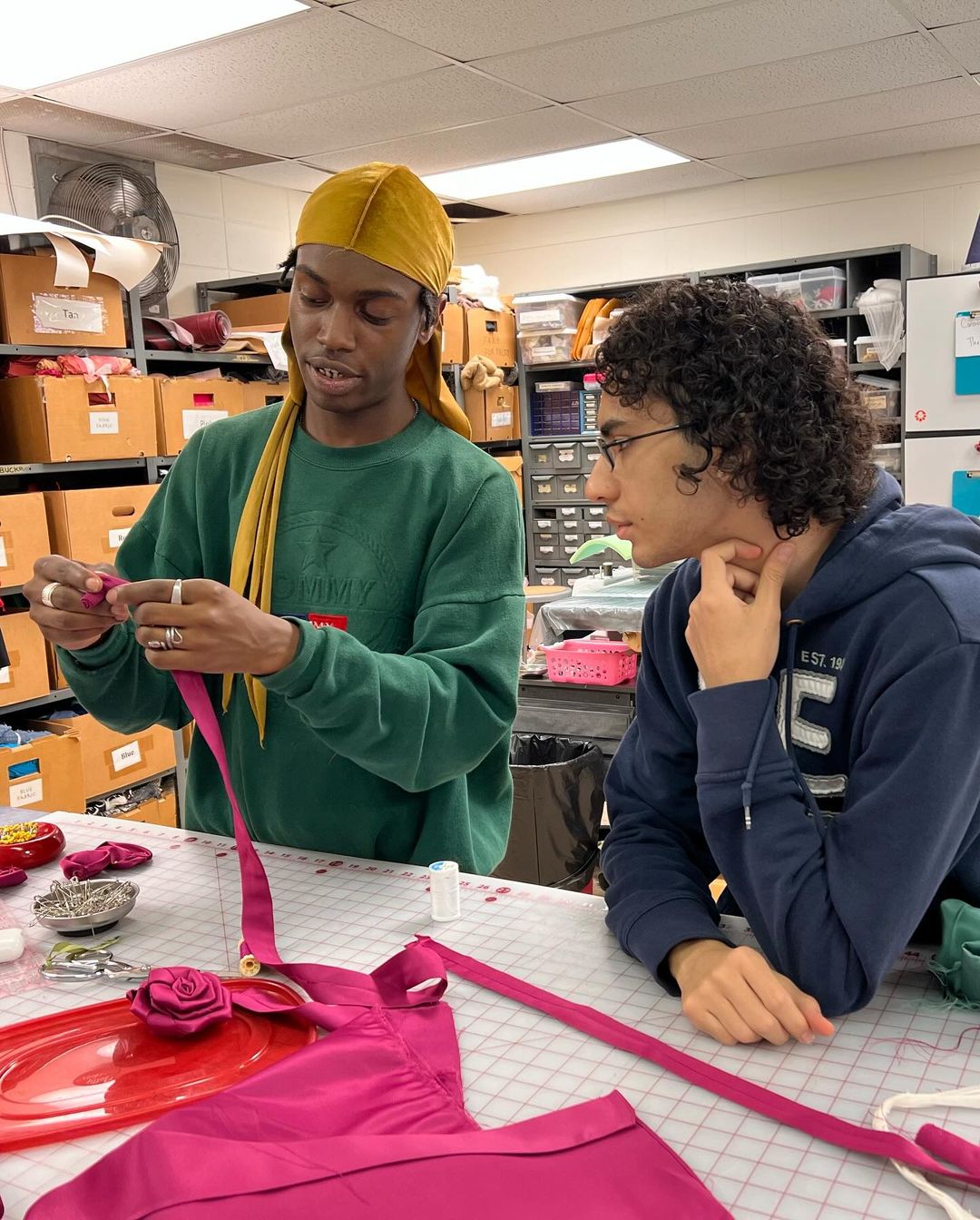The vibe in the costume shop is noticeably different one day a week, and it’s the day when K’tren Wilson ’24 isn’t around to fill the space with laughter while crafting an extravagant look for his upcoming show or the next theater production.

“Wednesdays are the only days he’s not down there and you can definitely tell,” Costume Designer and Shop Manager Andrea Bear said with a laugh. “K’tren’s a big personality who always brings this super positive energy into the shop that rubs off on everyone around him.”
Wilson has worked for Bear since his freshman year. In fact, she said the theater major and psychology minor from Southaven, Mississippi, landed the job before he even arrived to campus.
Bear remembers scrolling on the Wabash Class of 2024 Instagram page, where incoming students’ photos and biographies were featured, giving them an opportunity to connect with their peers and other members of the community. At that time, she was working with Paul Haesemeyer ’21, a former Wabash costume technician and current Fulbright winner.
“K’tren specifically said he likes fashion and theater. I said, ‘Paul, we have to reach out to this guy,’” Bear said. “So, Paul contacted him and said, ‘Hey, did you know there are jobs available in the costume shop?’ Turns out K’tren had no idea that was a thing he could do here.
“He applied for the job and we set up a Zoom interview,” she continued. “I was amazed by his creativity and how much theater and costuming experience he had as a high schooler. I knew he’d be the perfect fit.”
Wilson has worked as a costumer for a handful of Wabash shows, most recently including “Death and the Maiden.”
“It’s insane to think this is my last show,” Wilson said ahead of opening of the spring play. “I’ve been a part of nine or so shows here, and it blows my mind. I tell Andrea all the time, ‘When did you teach me how to do this thing that I just did? When did I learn that?’ The passage of time is insane.”
Last fall, he was the wardrobe supervisor for “Something Rotten!,” one of the biggest theater productions in the College’s history and the first musical to hit the Ball Theatre stage in nearly a decade. In that role, Wilson was responsible for leading a crew of four wardrobe members and ensuring that actors were dressed comfortably and quickly during the show’s run.

“The stakes in that role were higher,” Wilson said. “Being head of wardrobe put a bit more pressure on me unlike anything I had experienced before, and I feel like I perform well under pressure. It was fun for me to have this idea in my head of, ‘Ok, if you don’t do your job, other people aren’t going to be able to do theirs.’
“I enjoyed being there to support the actors, keeping them calm if they couldn’t get a zipper up or find the head hole,” he continued. “There were many times where I had to be like, ‘We’ll get it. It’s OK, just breathe. We still have six seconds, that’s like a minute in theater time!’”
Wilson participated in his first theatre production in eight-grade when he performed in “Hairspray.” After landing a leading role and working through the nerves that came with acting in front of crowds, he fell in love with the art and continued acting through high school.
“I’ve done too many shows to count since then, and been in a number of different roles from leading to supporting,” Wilson said. “I genuinely love the collaborative process of theater.”
Wilson has starred in a number of Wabash productions including “As You Like It” and “Where Is Our Beloved Community?” Bear believes being a performer has influenced the senior’s work in the costume shop, the way he works through problems, and how he collaborates with other students.
“Lin-Manuel Miranda once said to learn every single part of theater if you going into it because it will not only make you that much better of a professional in general, but it will also help you communicate better and more effectively with others,” Bear said. “I feel like that’s K’tren. He has this passion and drive to do it all.
“He’s a leader,” she continued. “With wardrobe and in the costume shop, he doesn’t hesitate if I ask him to do so—or sometimes I don’t even have to ask—for him to take over and train someone to do something, like thread the sewing machine or practice a specific stitch.”
In addition to his work in the Fine Arts Center, Wilson has also distinguished himself at Wabash through a variety of leadership roles and academic achievement. He’s a participant and former class tutor of the Wabash Liberal Arts Immersion Program (WLAIP), a member of Delta Tau Delta fraternity and ’shOUT, and is the former vice chairman of the Malcolm X Institute of Black Studies (MXIBS).

Bobby Horton, WLAIP program coordinator and psychology professor, said he could tell from the very beginning, before Wilson even arrived to Wabash, that he would be a leader. The two first connected via Zoom in the summer of 2020 when COVID-19 shut down the WLAIP’s in-person summer institute.
“My first impression that summer when we were meeting virtually with the class was that he was naturally going to be successful,” recalled Horton. “He was active and engaged in discussions. He had lots of great insights and questions. He was genuinely curious and interested in helping everyone get to a better answer.”
As he wraps up his last few months on campus, Wilson is focused on figuring out life after Wabash. He plans to continue designing and making clothes—either for fun or professionally—and hopes to pursue a career in marketing.
“When people remember me, I hope they remember me as being the best dressed,” Wilson said with a laugh. “More importantly, I hope to leave behind a legacy as someone who was authentic, critical, and kind.”
Wilson will be presenting “This Is Not For You (TINFY)” April 21 at 7 p.m. in the Experimental Theater in the Fine Arts Center.
He wrote the piece last semester for his senior seminar, and said research for the show primarily focused on experimental men’s fashion and Bayard Rustin, a human rights activist known for his work during the Civil Rights Movement.
“I was interested in the ways that people perceived Rustin as a queer intellectual, leader, and organizer as well as the ways he was discriminated as a result of his identity and the effects this had on him,” Wilson said. “All of this culminated into an exploration of identity, specifically my own and Bayard’s as queer, Black, socially active men in two very different eras.”
Wilson said audiences can expect to see men’s fashion reimagined, some imagery of identity being explored, and a celebration of any person that has ever felt they had to “tone it down” or fit into a mold.